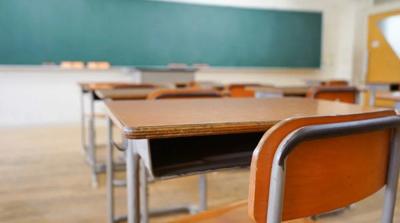
LOUISVILLE, Ky. (WDRB) – Since the start of distance education in response to the COVID-19 pandemic, Kentucky school districts have grappled with how students will be graded on work they’ve completed in unprecedented learning environments for the rest of the 2019-20 school year.
The issue of grading is especially important for students in high school, whose grade-point averages can affect their class ranks, how much scholarship money they receive through programs such as the Kentucky Educational Excellence Scholarship, and whether they’re accepted into their preferred colleges and universities.
In its guidance to school districts, the Kentucky Department of Education has left grading decisions to local policymakers.
Some districts, including Jefferson County Public Schools, are taking a “hold harmless” approach to grading for their older students, essentially allowing performance on nontraditional instruction work to boost their grades rather than hurt them.
The Oldham County Board of Education passed such a resolution during a meeting Monday.
Oldham County Schools Superintendent Greg Schultz said his primary concerns right now are student safety and whether they’re learning at a time when conventional learning has been upended.
The district’s teachers have done “a miraculous job on providing engaging lessons” since regular classes were called off in mid-March, he said.
“But we also just know that it’s not the same as having a live person in front of you,” Schultz said. “We’re trying to let people not stress about the grades, and let’s really think about the learning and what learning holes we may have going forward.”
Others, like Hardin County Schools, are continuing the grade coursework as normal.
More than 90% of Hardin County’s high school students have used the district’s online learning program, said Greg Sutton, the district’s chief academic officer.
Hardin County has also developed a strategy to allow students to check out Chromebooks if they lack such technology at home, and teachers there received extensive professional development opportunities to learn how to craft digital lessons and use interactive tools such as Google Meet, he said.
“We just kind of felt that if we could get a high percentage of our students on a digital platform and provide them face-to-face instruction on the content throughout the week that we would have an opportunity to fairly assess them,” Sutton said. “… We’re just trying to look for students that are giving an acceptable effort and completing the work.”
Sutton said the district is working on programs to help students recover lost credits after failing classes before or during nontraditional instruction once the school year ends May 15. He stressed that students will have multiple opportunities to complete coursework during distance learning.
“Whenever these social distancing restrictions actually lift, as the phases start to come back in, we would love … to have the opportunity to have kids back in front of a teacher for summer-school opportunities or credit-recovery opportunities at the high school level, and we’re still waiting for the state on guidance for that plan,” he said, noting that Hardin County may have to delay such in-person initiatives until after July 1.
Some school systems are still trying to figure out how to handle grading coursework completed in high school classes.
Rachelle Bramlage-Schomburg, director of secondary education for Bullitt County Public Schools, said the district is still developing a grading plan in consultation with KDE “to ensure we are making the best decision for our students’ success.”
Justin Bathon, an associate professor in the Department of Educational Leadership Studies at the University of Kentucky, said grading policies will undoubtedly vary depending on how prepared schools and districts were to provide instruction digitally.
But he believes students should not fail classes during nontraditional instruction programs but rather receive “incomplete” marks.
“It is not fair to issue failing grades for students right now,” Bathon said, noting that high school students could have responsibilities such as watching younger siblings or working in places such as grocery stores.
“There’s a lot going on in kids’ worlds right now besides the same emotional toll that’s on all of us having to live in a world of a global pandemic, and so to issue a failing grade at this moment is inappropriate,” he said.
The variety in grading strategies for higher level coursework comes as more than half of Kentucky’s school systems adjust to distance learning. Eighty-nine of the 172 school districts throughout the state entered nontraditional instruction for the first time in March.
Hardin, Oldham and Jefferson counties were among districts that had to develop nontraditional instruction plans more than halfway through the 2019-20 school year thanks to a waiver from KDE that was included in a COVID-19 emergency relief law.
“Thank goodness for it because there’s no way that we can just take off this much time with no learning going on,” Schultz said. “That would have been traumatic.”
Distance-learning efforts may come in handy when the 2020-21 school year begins in August.
Sutton said it’s unclear whether schools will be allowed to resume normal operations, with the specter of another COVID-19 wave.
Bathon hopes districts embrace digital learning to the point where teachers can be ready to conduct “real online school, not the emergency remote school that we’re seeing a lot of districts do right now.”
To do that, he believes policymakers at the local and state levels need to think strategically about purchasing equipment to connect those in high-poverty communities to the internet.
Urban districts such as JCPS and Fayette County Public Schools would need help funding such an initiative, he said, applauding efforts by JCPS to provide Chromebooks and data hotspots to those most in need.
“I wish that we had the finances to meet this challenge,” Bathon said. “We probably do not. We’re going to have to just do the best that we can.”
Copyright 2020 WDRB Media. All rights reserved.
